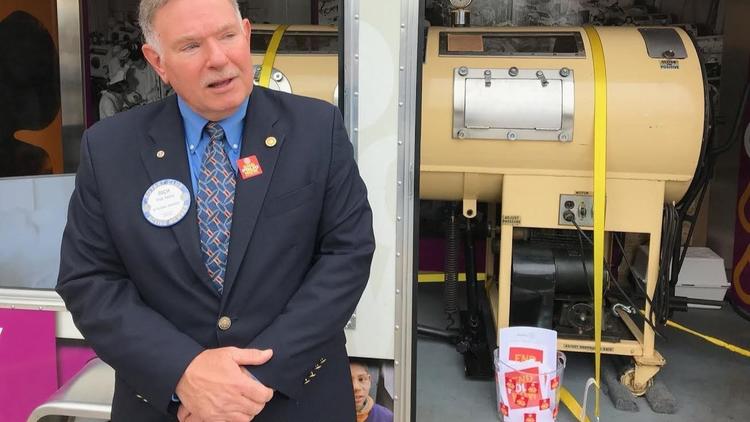Rachel Ossyra calls it her Rotary moment.

It was 2016 in Nigeria, and Ossyra was on a Rotary Club of Naperville’s (Illinois, US – D 6450) medical mission, in conjunction with a local humanitarian organisation, in the Enugu State in the southeast part of the country.
There is historical strife between different groups in Nigeria, and she was in an area where there had been conflict.
In one area, extreme violence had resulted in many villagers being massacred.
There were always security stops along the roadways, but there were more than usual because of the recent violence.
Ossyra was travelling in a car with a driver from the town of Nsukka to a satellite hospital about 1½ hours away.
The vehicle had a hospital sign on it.
For some reason she still does not know, at one security stop, the driver started going around the security station.
Heavily-armed soldiers stepped out and stopped them, waving them to the back of the line.
“We started to creep up and when we got to the front, a soldier just started berating the driver,” Ossyra said.
“They were going back and forth. It was pretty tense.”
At that point, the soldier turned to Ossyra and said, “So are you a doctor?” She answered, “No, I’m a Rotarian.”
“His whole composure instantly changed,” she said.
“He smiled. He waved the driver on and said, ‘You take care of my sister’ – he called me his sister – he said you make sure she gets where she’s going.”
“The minute he found out I was a Rotarian, it all changed,” she said.
“It was as if we were connected. It was because of what Rotary had done — the integrity, the sincerity of the effort to eradicate polio.”
Ossyra is now the president-elect of the club in Naperville, which means she will become president in 2019.
She also serves on district committees. But she calls that day in Nigeria her Rotary moment because it illustrates perfectly the impact of one of Rotary International’s main missions – to eradicate polio around the world.
Rotary members worldwide recognised that recently on World Polio Day, celebrated by the international organisation with a televised programme, but also celebrated in different ways by individual clubs.
The Rotary Club of Aurora sponsored a get-together to watch a live stream of the international programme, inviting members of other clubs.
Gretchen Timms, president nominee of the club, which means she will become president in 2020, said Rotary International has been doing its programme for six or seven years, but this was the first year the Aurora club sponsored a fellowship event around the international programme.
The event was successful enough to encourage the club to expand its efforts and get more clubs together next year.
There are two clubs in Aurora – the lunchtime Rotary Club of Aurora and the breakfast Aurora Sunrise Rotary Club.
The Rotary Club of Naperville – one of four clubs in Naperville, which also includes Rotary Club of Naperville Sunrise, Rotary Club of Naperville Downtown and Rotary Club of Naperville After Dark — celebrated a week later at its regular meeting by bringing in the portable iron lung exhibit, owned by the district.
It educates people about the history of polio, its impact on America, and the history of the battle to eradicate it.
The centerpiece of the exhibit is an actual iron lung, at one time used to help people, whose lungs were paralysed by the disease, breathe.
“Polio fundamentally attacks muscles,” said Richard Tatara, Rotary Club of Naperville Foundation chairman.
“For some people, it would attack their diaphragm, so they couldn’t breathe. They would use the iron lung to keep them alive.”
In 1952, there were 58,000 people with polio, and 3,145 deaths due to the disease, in the United States.
By 1977, it was estimated some 254,000 people in the country had some kind of permanent paralysis from polio.
The vaccine developed and first used in 1955 by Dr Jonas Salk helped start the eradication of the disease in the US.
As that vaccine spread throughout the world, the fight against polio was engaged.
Still, by 1985, an estimated 1,000 people a day contracted the disease around the world.
That’s when Rotary International began making it a priority, putting intense fundraising toward getting the vaccine to children all over the world.
Rotary raises money in several ways to finance the fight against polio.
And every dollar raised is matched by two more dollars from the Bill and Melinda Gates Foundation.
Today, wild virus polio has been basically eradicated in every country except Nigeria, Afghanistan and Pakistan.
In Nigeria, great strides have been made. At one time, officials thought it was eradicated there too, but several cases made them restart the clock on whether or not it was eradicated in Nigeria.
There must be no cases of the disease for three years before declaring it eradicated.
Rotary works to get vaccine to as many places as possible, from cities to the most remote villages, as has been done in Nigeria.
But in addition to the vaccine, officials also work to better the environment where the polio virus can breed.
Tatara said it was an “eye-opener” to him to find out how much environmental work is done as part of the battle against polio.
“It’s all part of the infrastructure,” he said. “There is a lot more science to it.”
Rotary members pointed out that even though the wild virus has been eradicated many places, there is little time for resting on one’s laurels in the fight against polio.
“To be vigilant is a good thing,” Timms said.
Timms and Tatara pointed out that fighting disease around the world helps everyone.
It is part of Rotary’s world focus on not only fighting disease, but promoting peace, providing clean water, serving mothers and children, supporting education and energising local economies.
“No child should suffer from a vaccine-preventable disease,” Timms said. “It’s preventable.”
Source: Chicago Tribune





